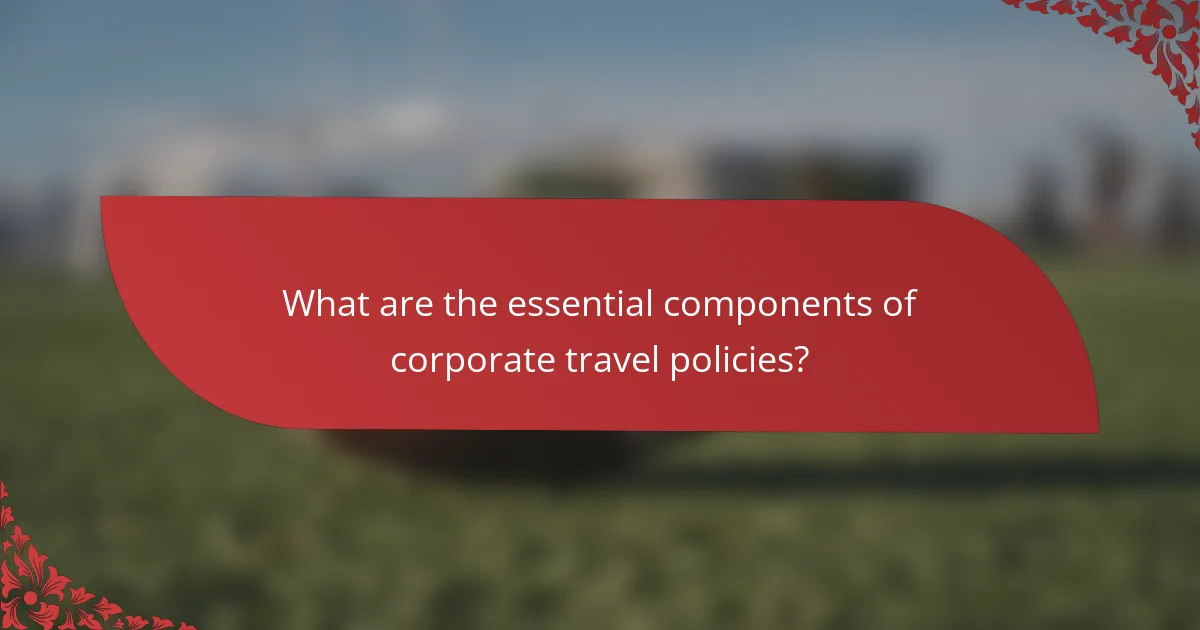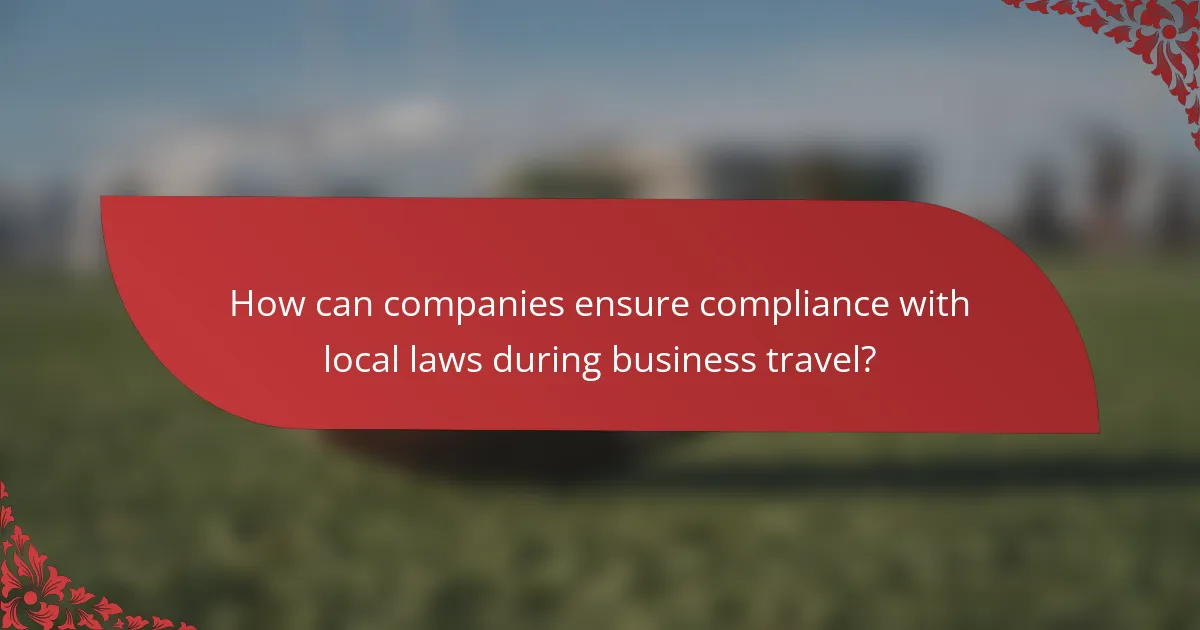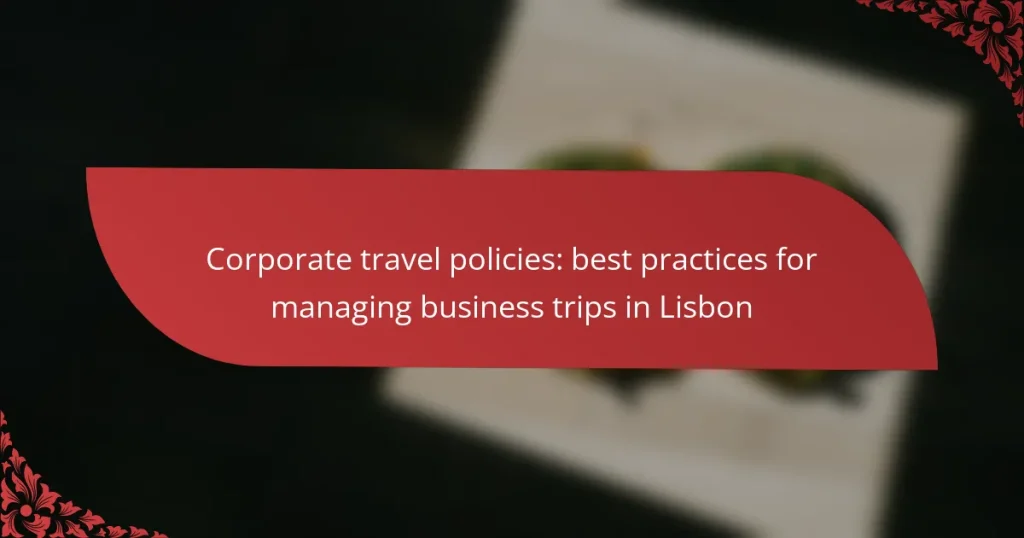Effective corporate travel policies are essential for managing business trips in Lisbon, addressing unique challenges like local regulations and cultural differences. Key practices include defining travel booking procedures, setting expense limits, and ensuring employee safety. Utilizing technology for streamlined bookings and compliance monitoring enhances efficiency. Regular policy reviews based on employee feedback contribute to improved travel experiences.

What are the essential components of corporate travel policies?
Essential components of corporate travel policies include clear guidelines on travel booking, expense management, safety protocols, and compliance with company standards. These elements ensure efficient travel management and cost control.
1. Travel Booking: Define preferred vendors and booking procedures.
2. Expense Management: Set limits on spending and reimbursement processes.
3. Safety Protocols: Outline health and safety measures during travel.
4. Compliance: Ensure adherence to legal and regulatory requirements.
5. Communication: Establish channels for traveler support and updates.
6. Review Process: Regularly assess and update policies based on feedback.
How do travel policies impact employee satisfaction?
Corporate travel policies significantly influence employee satisfaction by providing clarity and support during business trips. Effective policies enhance the travel experience, leading to higher morale and productivity. Key best practices include offering flexible travel options, ensuring comfort, and providing clear guidelines. For instance, policies that allow employees to choose accommodations can improve their overall satisfaction. Additionally, addressing unique needs, such as dietary restrictions or travel preferences, fosters a more inclusive environment. As a result, companies that prioritize employee-centric travel policies often see increased engagement and retention rates.
Which regulations must be considered in corporate travel?
Corporate travel regulations in Lisbon include compliance with local labour laws, tax regulations, and safety protocols. Companies must ensure adherence to travel restrictions, visa requirements, and insurance policies. Additionally, understanding expense reporting guidelines is crucial for managing budgets effectively. These regulations help mitigate risks and ensure smooth business operations during trips.

What best practices enhance efficiency in business trip management?
Implementing effective corporate travel policies enhances efficiency in business trip management in Lisbon. Key practices include establishing clear guidelines, utilizing technology for bookings, and prioritising employee safety and comfort.
1. Develop comprehensive travel policies that outline procedures, expense limits, and approval processes.
2. Use travel management software to streamline bookings, track expenses, and manage itineraries.
3. Communicate policies effectively to ensure all employees understand guidelines and expectations.
4. Regularly review and update policies based on feedback and changing business needs.
These best practices contribute to a smoother travel experience, reducing administrative burdens and enhancing employee satisfaction.
How can technology streamline corporate travel processes?
Technology can significantly streamline corporate travel processes by automating booking, enhancing communication, and optimising expense management. Implementing a centralised travel management system allows companies to enforce travel policies effectively. This system can integrate with other tools, providing real-time data on costs and compliance.
Mobile applications improve the traveller experience by offering itinerary updates and support. Data analytics can identify trends, helping businesses refine their travel policies for efficiency and cost savings. For example, using AI to analyse travel patterns may reveal opportunities for bulk bookings, reducing overall expenses.
In Lisbon, leveraging local partnerships with hotels and transport services can enhance service quality while ensuring adherence to corporate travel policies. This approach not only fosters better relationships with service providers but also aligns with sustainability goals by supporting local businesses.
Ultimately, technology facilitates a smoother travel experience, ensuring employee satisfaction and adherence to corporate guidelines. By continuously evaluating and updating travel policies based on data insights, companies can maintain an efficient and effective travel process.
What role do travel management companies play in optimising trips?
Travel management companies streamline business trips by managing logistics, ensuring compliance with corporate travel policies, and optimising costs. They offer services like booking, itinerary management, and expense tracking, enhancing efficiency and traveller satisfaction. By leveraging technology, these companies provide real-time data and analytics, which helps organisations make informed decisions regarding travel. This approach reduces travel-related stress for employees and fosters adherence to established policies, ultimately contributing to effective business operations in Lisbon.

Which unique challenges arise when managing business trips in Lisbon?
Managing business trips in Lisbon presents unique challenges such as navigating local regulations, cultural differences, and logistics. Companies must adapt corporate travel policies to address these factors effectively.
Key challenges include fluctuating transportation availability, language barriers, and varying accommodation standards. Additionally, understanding local customs can impact meeting effectiveness.
To mitigate these issues, organisations should establish clear guidelines and provide resources for employees. This ensures compliance and enhances the overall travel experience.
Lastly, leveraging technology for booking and communication can streamline processes, making business trips more efficient in Lisbon.
How do cultural factors influence corporate travel in Lisbon?
Cultural factors significantly shape corporate travel in Lisbon by influencing business practices and social interactions. Understanding local customs and etiquette enhances relationship-building during trips.
Lisbon’s emphasis on hospitality promotes a welcoming atmosphere for business travellers, encouraging networking and collaboration. Additionally, the city’s rich cultural heritage impacts meeting styles and negotiation tactics, favouring personal connections over formalities.
Companies should adapt their travel policies to reflect these cultural nuances, fostering an environment that respects local traditions. This approach can lead to more successful business outcomes and stronger partnerships in Lisbon.
By integrating cultural awareness into corporate travel strategies, organisations can optimise their business trips and enhance overall effectiveness.
What are the common pitfalls in Lisbon business trip planning?
Common pitfalls in Lisbon business trip planning include inadequate understanding of local regulations, poor itinerary management, and lack of cultural awareness. Failing to comply with local business practices can lead to misunderstandings. Additionally, not allocating sufficient time for meetings or travel can disrupt schedules. Lastly, overlooking local customs may hinder relationship building.

How can companies ensure compliance with local laws during business travel?
Companies can ensure compliance with local laws during business travel by establishing clear corporate travel policies. These policies should include guidelines on legal requirements, such as visa regulations and local labour laws, which vary significantly by region.
Regular training sessions for employees can help them understand their responsibilities while travelling. Additionally, companies should utilise local legal resources or consultants to stay updated on changing regulations in Lisbon. Monitoring compliance through regular audits can further enhance adherence to local laws.
Incorporating technology, such as travel management systems, can streamline compliance by providing real-time updates and alerts about local laws. This proactive approach minimises risks associated with non-compliance during business trips.
What are the key legal considerations for corporate travel in Portugal?
Key legal considerations for corporate travel in Portugal include compliance with local labour laws, tax regulations, and visa requirements. Companies must ensure that employees adhere to the Portuguese tax system during business trips. Additionally, understanding employee rights, such as working hours and health insurance, is crucial. Contracts with service providers should clearly outline terms to avoid disputes. Lastly, data protection laws, particularly GDPR, must be followed when handling personal information during travel.
How should companies handle unexpected legal issues during trips?
Companies should establish clear protocols for handling unexpected legal issues during trips. First, ensure travellers have access to local legal resources. Provide a list of emergency contacts, including legal assistance, local authorities, and company representatives.
Second, train employees on the legal aspects of their destination, emphasising compliance with local laws. This proactive approach minimises risks.
Third, maintain an open line of communication. Employees should report issues immediately to designated contacts who can guide them through the situation.
Lastly, review and update corporate travel policies regularly to incorporate lessons learned from past incidents. This ensures preparedness for future challenges.

What metrics should be used to evaluate the effectiveness of travel policies?
To evaluate the effectiveness of corporate travel policies, use metrics such as cost savings, employee satisfaction, compliance rates, and trip efficiency. These indicators provide insights into policy performance and areas for improvement.
| Metric | Description |
|—————————-|————————————————–|
| Cost savings | Reduction in travel expenses compared to budget |
| Employee satisfaction | Feedback scores from travellers on policy impact |
| Compliance rates | Percentage of trips adhering to established policies |
| Trip efficiency | Average time spent on travel versus scheduled time |
How can companies measure the return on investment for corporate travel?
Companies can measure the return on investment for corporate travel by analysing cost savings, productivity gains, and employee satisfaction. Tracking expenses against the outcomes of business trips offers valuable insights. Metrics such as reduced travel costs, increased sales, and improved client relationships help assess effectiveness. Additionally, employee feedback on travel experiences can inform future policy adjustments. By employing these strategies, organisations can optimise corporate travel policies in Lisbon effectively.
Which KPIs are most relevant for assessing travel policy success?
Key performance indicators (KPIs) for assessing corporate travel policy success include cost savings, traveller satisfaction, compliance rates, and booking efficiency. These metrics provide insights into policy effectiveness in managing business trips in Lisbon.
Cost savings measure the financial impact of the travel policy by comparing expenses against budgets. Traveller satisfaction gauges employee experiences and aligns travel with preferences. Compliance rates evaluate adherence to the policy, ensuring guidelines are followed. Booking efficiency assesses the time spent on travel arrangements, reflecting the policy’s ease of use.
By monitoring these KPIs, organisations can refine their travel policies to enhance effectiveness and employee satisfaction.

What are the emerging trends in corporate travel management?
Emerging trends in corporate travel management focus on sustainability, technology integration, and personalised travel experiences. Companies increasingly prioritise eco-friendly travel options to reduce their carbon footprint. Technology plays a crucial role, with tools that streamline booking and expense management. Personalisation enhances traveller satisfaction by catering to individual preferences. These trends are reshaping corporate travel policies, making them more adaptive and efficient.
How is sustainability influencing corporate travel policies?
Sustainability is significantly shaping corporate travel policies by prioritising eco-friendly practices. Companies are adopting measures such as reducing carbon footprints, utilising public transportation, and choosing sustainable accommodations. This shift not only enhances corporate responsibility but also meets the growing demand for environmentally conscious travel options. As a result, businesses in Lisbon are increasingly integrating sustainability into their travel strategies to align with global environmental goals.
What innovations are shaping the future of business travel?
Innovations shaping business travel include increased use of technology, sustainable practices, and flexible corporate travel policies. Companies are adopting mobile apps for booking and expense management, enhancing the traveller experience. Sustainable travel initiatives, such as carbon offset programmes, are becoming standard, reflecting corporate responsibility. Flexible policies allow for personalised travel arrangements, accommodating employee preferences while maintaining budget controls. These trends collectively enhance efficiency and satisfaction in business travel management in Lisbon.
What expert tips can optimise corporate travel policies for success?
To optimise corporate travel policies for success in Lisbon, focus on clear guidelines, cost management, and traveller support. Establish a comprehensive policy that outlines booking procedures, preferred vendors, and expense limits. Encourage the use of technology for travel bookings and expense reporting, enhancing efficiency. Regularly review and update policies to adapt to changing business needs and traveller feedback. Consider the unique aspects of Lisbon, such as local transportation options and cultural norms, to improve employee experience.




